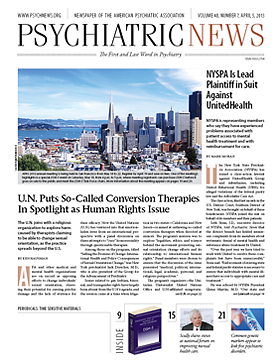Even in ancient times, physicians and philosophers had some sense of how thoughts and emotions influence the onset or maintenance of illness. Yet the modern era of psychosomatic medicine really started during the 1930s when researchers discovered fight-or-flight reactions to danger and how emotions could speed the heart or slow the gut.
And since then, especially since the dawn of the 21st century, the field has become much more scientifically based, psychosomatic medicine experts say.
“One of the exciting findings in psychosomatic medicine in recent years has been the realization of how prevalent mental illnesses in medical patients are and how such comorbid mental illnesses can adversely affect medical outcomes,” Robert Joseph, M.D., director of consultation-liaison psychiatry at the Cambridge Health Alliance in Cambridge, Mass., told Psychiatric News. “Those findings have brought home the importance of managing comorbid mental illnesses. They have also caught the attention of policymakers, such that comorbid mental illnesses are now much more readily accepted. That has influenced payment structure as well.”
Cases are often more complex than previously thought, another psychosomatic medicine expert, Thomas Wise, M.D., pointed out during an interview. In addition to being a professor of psychiatry at the Johns Hopkins and George Washington medical schools, Wise is medical director of behavioral health services at Inova Health Systems in Falls Church, Va.
For instance, “during the 1950s, you would see television ads of people getting stressed out and taking Tums to prevent stress-induced stomach ulcers,” Wise recalled. “But since then, we’ve learned that stomach ulcers are due not just to stress, but to certain psychological characteristics, to certain behaviors, and most crucially, to a bacterium called Helicobacter pylori. It could actually be this combination of factors that sets the stage for an ulcer, since 80 percent of the American population has H. pylori in their gut, but only a small number of them get ulcers from it.”
“We have also learned that emotions are important in diseases that we never really thought about before—heart disease being a clear example,” Wise continued. “We now know that people who are depressed after having a heart attack are at a three- to five-fold increased risk of dying than those who are not depressed after a heart attack. That is a really important finding because it means that you should screen for depression in all patients who have had heart attacks. And I’m not sure that it’s done on a regular basis across the board.”
In recent years, several studies have evaluated whether SSRI antidepressants could counter depression following a heart attack, Isidore Berenbaum, M.D., associate director of the consultation-liaison service at Boston University, told Psychiatric News. Unfortunately the results haven’t “been as satisfactory as we had hoped,” he said. “But that is a place, I think, where a lot more work is going to be done.”
Still another vital discovery, he pointed out, is the role that anxiety and depression play in irritable bowel syndrome. “Being able to use low doses of the SSRI antidepressants has made a big difference” in the lives of people with the syndrome, he said.
Several other research areas in psychosomatic medicine—psychoneuroimmunology (Psychiatric News, August 3, 2012) and the role of distress in cancer (Psychiatric News, March 16, 2012)—are also leading to valuable findings, Wise noted.
In recent years, the field has also expanded its scope of practice, several psychosomatic medicine experts reported.
Programs to treat and prevent delirium have been established in hospitals, Joseph said. “And there have been even more dramatic changes in the ambulatory world. A generation ago, there was very little ambulatory involvement in psychosomatic medicine. But now there are increasing models of ambulatory care delivery by psychosomatic medicine that involve chronic disease management.”
There is also a trend toward stepped care, Wise said. “Stepped care means you don’t wait for a patient to come to you when depressed or anxious. You screen a whole population for, say, depression or anxiety. And those who are depressed or anxious, you try to treat.”
The concept of collaborative care between psychiatrists and family doctors, which is much in the news of late, started about 30 years ago in England and was imported into the United States during the 1990s, notably by Wayne Katon, M.D., of the University of Washington, and his colleagues (Psychiatric News, March 6, 2009; January 18).
“Katon’s work is extremely important to our field,” Mary Jane Massie, M.D., an attending psychiatrist at Memorial Sloan-Kettering Cancer Center, said.
Today, efforts are being made to establish collaborative care not just between psychiatrists and family doctors, but between psychiatrists and other kinds of clinicians, Linda Worley, M.D., a professor of psychiatry and obstetrics-gynecology at the University of Arkansas and president-elect of the Academy of Psychosomatic Medicine, noted. “For instance, psychiatrists are being hired to work with transplant teams and programs.”
But major advances in the field’s scientific knowledge and scope of practice are probably still to come, experts say.
“In terms of fundamental research, I anticipate that the field will focus intensively on somatic-symptom perception,” said Joel Dimsdale, M.D., of the University of California, San Diego, who is chair of the APA Council on Psychosomatic Medicine. “Arthur Barsky, M.D., a psychiatrist at Brigham and Women’s Hospital in Boston, has led the way in emphasizing cognitions—how somatic symptoms are amplified or dampened. That work will continue and will be augmented by research in neural physiology and neural imaging.
“In terms of clinical practice,” Dimsdale continued, “I imagine the field will focus on developing even tighter interactions between psychiatry and other medical specialties.”
Worley concurred: “I think psychosomatic medicine is going in an exciting direction, that we’re really reconnecting psychiatry with the rest of medicine.”
“And, eventually, I think we are going to see a subsubspecialty called ‘primary care psychiatry’ emerge,” Wise predicted. ■
